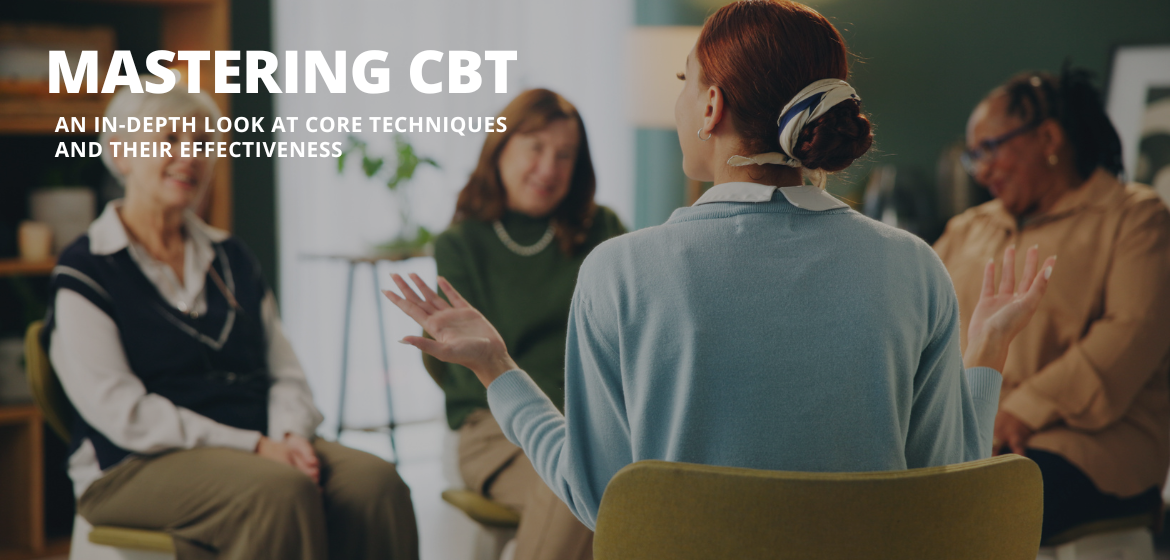
Mastering CBT: An In-Depth Look at Core Techniques and Their Effectiveness
Cognitive Behavioural Therapy (CBT) is one of the most widely used and effective forms of psychotherapy. It is grounded in the idea that our thoughts, feelings, and behaviours are interconnected and that changing maladaptive thinking can lead to changes in emotions and behaviours. This article explores the core techniques used in CBT, supported by references to research that highlights their efficacy.
Cognitive Restructuring
Cognitive restructuring is a fundamental technique in CBT that involves identifying and challenging distorted or irrational thoughts (cognitive distortions). The goal is to replace these thoughts with more balanced and rational ones. Common cognitive distortions include all-or-nothing thinking, overgeneralization, and catastrophising. A study by Hofmann et al. (2012) in “Cognitive Therapy and Research” found that cognitive restructuring significantly reduces symptoms of anxiety and depression. The study suggests that challenging negative thoughts helps individuals develop a more realistic and positive outlook, which in turn improves emotional well-being.
Behavioural Activation
Behavioural activation focuses on increasing engagement in positively reinforcing activities to combat depression and improve mood. This technique helps clients break the cycle of avoidance and inactivity that often accompanies depression. A meta-analysis by Cuijpers et al. (2007) in “Clinical Psychology Review” demonstrated that behavioural activation is as effective as traditional CBT and other forms of therapy for treating depression. The study highlights that engaging in meaningful activities can lead to significant improvements in mood and overall functioning.
Exposure Therapy
Exposure therapy is primarily used to treat anxiety disorders, including phobias, panic disorder, and PTSD. It involves gradual exposure to feared objects or situations in a controlled and safe manner, with the aim of reducing fear and avoidance behaviours. According to a review by Powers et al. (2010) in “The Journal of Anxiety Disorders,” exposure therapy is highly effective for anxiety disorders. The review notes that repeated exposure to feared stimuli helps clients desensitize and reduce their anxiety responses over time.
Cognitive Behavioral Techniques for Insomnia (CBT-I)
CBT-I is a specialized form of CBT designed to treat insomnia. It incorporates techniques such as stimulus control, sleep hygiene education, and relaxation training to improve sleep patterns. A study by Morin et al. (2006) in “Sleep” found that CBT-I is highly effective for chronic insomnia, with lasting benefits. The study indicates that CBT-I helps individuals develop healthier sleep habits and reduce reliance on sleep medications.
Mindfulness-Based Cognitive Therapy (MBCT)
MBCT combines traditional CBT techniques with mindfulness strategies. It is particularly effective for preventing relapse in individuals with recurrent depression. MBCT teaches clients to focus on the present moment and develop a non-judgmental awareness of their thoughts and feelings. A randomised controlled trial by Teasdale et al. (2000) in “The Journal of Consulting and Clinical Psychology” showed that MBCT significantly reduces the risk of relapse in individuals with recurrent depression. The study highlights that mindfulness practices help clients break the cycle of rumination and negative thinking patterns.
Problem-Solving Therapy
Problem-solving therapy helps clients develop effective coping strategies to manage life’s challenges. This technique involves identifying problems, generating potential solutions, and evaluating the effectiveness of those solutions. A study by Nezu et al. (2001) in “The Journal of Consulting and Clinical Psychology” found that problem-solving therapy is effective in reducing symptoms of depression and improving quality of life. The study suggests that enhancing problem-solving skills empowers clients to handle stress more effectively.
Conclusion
Cognitive Behavioural Therapy encompasses a range of techniques that target both cognitive and behavioural aspects of mental health. The core techniques—cognitive restructuring, behavioural activation, exposure therapy, CBT-I, MBCT, and problem-solving therapy—are supported by substantial research evidence demonstrating their efficacy. By employing these techniques, therapists can help clients achieve significant and lasting improvements in their mental health.
Want to learn more?
We are currently enrolling for the M.A. in Counselling & Psychotherapy (Cognitive Behavioural Modalities) which supports learners to develop personally & professionally to enable them to achieve a Masters’s Degree in Counselling & Psychotherapy.






















